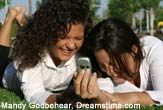Autism Linked with Lack of Concern for Personal Reputation, Study Finds

People tend to change their behavior in social situations in order to boost how others see them — for instance, they may act more altruistically if they know their actions are being publicly scrutinized. However, such a concern for reputation may be lacking in those who have the developmental disorder autism, a new study finds.
In the study, people with autism made the same number of donations to charity regardless of whether they were being watched by another person. In contrast, people without autism made more donations when they were under observation, compared with when they donated in private.
"The results argue that people with autism lack the ability to take into consideration what others think of them," the researchers said.
"We know that individuals with autism have social difficulty, but we are not sure what 'social difficulty' exactly means," said study researcher Keise Izuma, of the California Institute of Technology. "I think our results provide one answer for it," and may help develop new therapies for the disorder, Izuma said.
The study will be published this week in the journal Proceedings of the National Academy of Sciences.
Donation to charity
The study involved 10 adults with autism and 11 healthy adults without autism. Those with autism had IQs within the normal range, but had impaired social skills.
Sign up for the Live Science daily newsletter now
Get the world’s most fascinating discoveries delivered straight to your inbox.
In a computer game, subjects were allotted a sum of money, and then asked if they wanted to donate a certain amount to charity. In each proposed transaction, the charity would gain a certain amount of money while the participant would lose a certain amount; participants could accept or reject the transaction. There were real-life stakes for agreeing to donate: At the end of the study, one of the transactions was randomly chosen as the amount to donate to a real charity. (If that transaction had been rejected, no money was donated.)
When an observer was present, adults without autism donated more often to charity; that is, they "accepted" more transactions. However, the presence of an observer did not affect the number of donations made by autistic individuals.
Both groups were also asked to carry out a task to assess their level of attention. Participants were shown letters on a screen, and had to press a button every time they saw the letter X. When an observer watched them perform this task, participants in both groups did better, indicating they were more attentive. This showed that the autistic individuals were aware of the presence of the observer, but it did not affect their decision to donate to charity.
The researchers noted their experiments were conducted in a laboratory, and said future research is needed to see if the findings hold true in the real world.
Thinking about reputation
Autistic individuals may have problems with "metacognition" — in this case, thinking about what other people think of them, the researchers said. Past studies suggest that people with autism have difficulties with the ability to understand the beliefs and intentions of others.
It's also possible that, for autistic individuals, boosting one's social reputation is not rewarding as it is for other people without the condition. This may be because the brains of autistic individuals process rewards differently.
The concern most people have for their social reputation appears to be tied to certain areas of the brain, Izuma said. Future research should investigate whether these parts of the brain are affected in those with autism.
Pass it on: People with autism may not be able to take into account what other people think of them.
This story was provided by MyHealthNewsDaily, a sister site to Live Science. Follow MyHealthNewsDaily staff writer Rachael Rettner on Twitter @RachaelRettner. Find us on Facebook.

Rachael is a Live Science contributor, and was a former channel editor and senior writer for Live Science between 2010 and 2022. She has a master's degree in journalism from New York University's Science, Health and Environmental Reporting Program. She also holds a B.S. in molecular biology and an M.S. in biology from the University of California, San Diego. Her work has appeared in Scienceline, The Washington Post and Scientific American.










